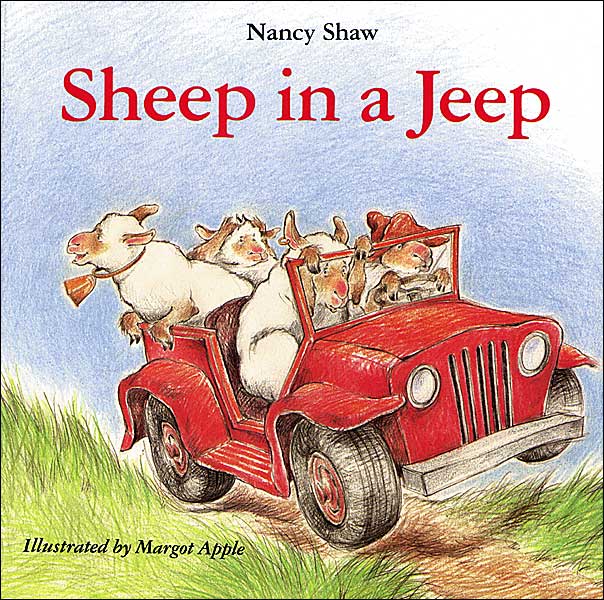There are 3 "tricks" that I use as both a parent and a teacher that I find to be very effective. (Settle down for a while, this is a long one!)
RoutinesMy children at school know exactly what is expected when. They know that when they first come in, they need to: hang their things up, select their lunch choice, check their job for the day, and start their morning work. The morning work itself is a routine, they know they have to get a paper from a basket, show me when it's done, put their stamp on the paper, and start either their journal or their upper/lower case letter coloring book. They know that when those tasks are all finished, they may then either work on a computer, color, read, or do a puzzle. And that's just for the first 30-45 minutes of the day. Everything we do is consistent and has it's own routine. Woe be to the substitute teacher who doesn't do things my way! The children are sure to tell him or her! It takes a good two to three weeks in the beginning of the year to get to this point, but the payoffs are wonderful. The children know exactly what is expected when, and can be very independent without needing me to tell them each step. They also know what will be coming next, which helps them transition from one activity to another easily.
At home, I find routines to be very helpful as well. It's obviously not quite as structured as school, but Daniel and I still have some things that we do the same way every day. During last summer, we would get up, watch a little TV with breakfast, and then play for a few hours. About an hour before lunchtime, I would take him outside to play. Then we'd have lunch, and take a nap. After his nap,there would be some more playtime, then dinner. We'd watch some Little Bear after dinner to wind down, and then the bedtime routine would start: bath, teeth, diaper, pajamas, story, bed. He often knows what's coming next, so it's less of a hassle to change activities than it might be.
ChoicesI am a strong believer in giving children reasonable choices. It offers them the chance to be decision makers, gives them ownership of the task they are doing, and gives them some control in a world that is often controlled by others. As a teacher, there are many things I need to do during the day, but they don't all have to be done a certain way. My children at school are conscious of which things are choices and which are not. They will often ask me "Is this a choice?" It's their choice whether they use crayons or colored pencils when coloring something. Whether they finish it or not is NOT a choice! I consciously create situations where they can have a choice about how they complete something. I find they work better after they've been allowed to choose the way in which they do it.
Our learning center time is very strongly arranged around choices. I have about 16 learning center activities that I want the children to complete throughout the week. They work in pairs (of my choosing) and may decide what centers they want to do first. As long as they complete all the tasks by the end of the week, what difference does it make what order they do them in? I used to have centers organized by groups working on 4 centers a day (no choices), and find that with the partner/choice system I'm doing much less directing of what they should do and more on the spot helping with the ones who need extra support. They are also much more motivated to keep working when they decide where they want to go. Sometimes there will be a pair that starts to fool around, and I simply say to them "If you can't choose where to go next, I will choose for you." This quite easily gets them back on track!
At home, I do the same thing with Daniel. I do limit his choices somewhat, only so he doesn't get overwhelmed. For instance, in the morning he gets to pick which of two shirts he wants to wear. He gets to pick what he wants for breakfast from a menu of mom-approved items. He can pick what stories he wants to hear at bedtime. He has a choice of whether he wants to calm himself down in the living room (or wherever he's throwing his fit) or in his crib. This gives him a bit of that much-longed for independence that all children want, but he is still working within the limits I give him. I do have one warning for those offering choices...never give a choice unless you're comfortable with which one your child picks! You can back yourself into a corner that way. Make sure both choices are legitimate. You can tweak the choices though, to encourage one over the other. For example, when I ask Daniel to choose whether he wants to calm down where he is or in his crib, he will often try to settle himself where he is rather than go back to his crib. However, if he cannot settle, he ends up losing the choice by default. If he's choosing to not calm down out in the living room, then back to the crib he goes.
At school, (and at home, but this occurs less often due to Daniel's age) we also talk about good choices and bad choices when it comes to behavior. If a child pushes another child because the first child "budged" we talk about choices. Was it a good choice to push? What would have been a better choice? What will they choose to do next time? Since they did make a bad choice, what should they now do about it? This leads to my last "trick", logical consequences.
Logical ConsequencesOne of my students wrote on the table the other day. She had to scrub it clean during her playtime. Another student was throwing a puzzle piece across the room. He was told he could not play with the puzzles any more that day. Two boys broke a leg on the music teacher's dry erase board when they were fooling around while there was a substitute. They had to sit during their playtime and write an apology letter. I helped them with sounding out the words, but they did the writing and delivering. These are just a few examples of the logical consequences I use during the school day. Sometimes the logical consequence for a certain behavior is a loss ofprivileges. Other times, the child "fixes" what went wrong somehow.
As a parent of a toddler, logical consequences come naturally. If Daniel makes a mess, he needs to help me clean it up. If he has a tantrum, he needs to go somewhere to calm himself down. It's basically cause and effect. The children (hopefully!) realize "Oh, if I do this, then I end up having to do this" or "If I do this, I lose the right to do this." It's logical!
******
What tricks do you have as parents? What have you used in the past that worked well, or what do you use now? Feel free to comment!

























